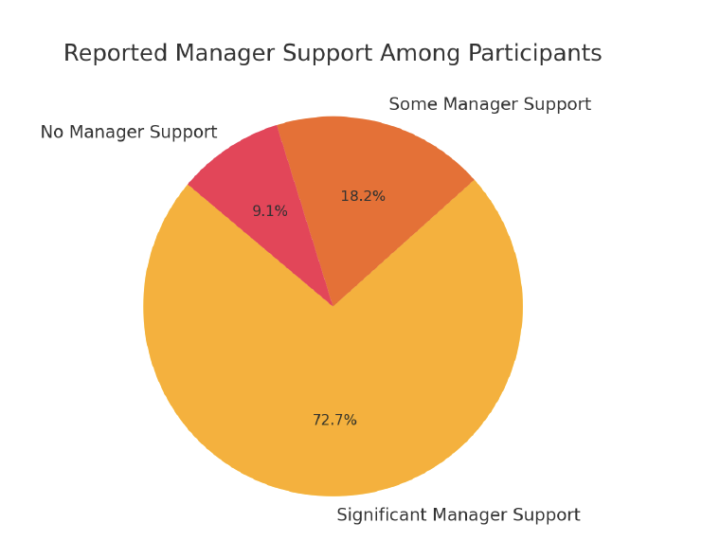When I started my graduate school program in 2023, I had a burning passion to explore something deeply relevant to my work with clients—how to sustain leadership development over time. Too often, organizations invest in leadership training and coaching only to see momentum fade over time. I wanted to understand what truly makes development stick and translate into long-term success.
Through my research, Sustaining Leadership Development Practices, I uncovered key factors that help leaders maintain their growth—understanding personal motivators, support from managers and others, use of development tools, and consistently using new skills. The findings validate the need to invest in developing leaders. More importantly, data from the research allowed me to create actionable strategies for individuals and organizations looking to maximize their investment.
If you’re committed to building leaders who want to create long-term habits, this research is for you! Even better, reach out to me. I would love to talk about the research project that still inspires me and can really make a difference. Here is a brief executive summary:
Research Project Executive Summary by Deborah Degner, MA, Human Dimensions of Organizations – University of Texas at Austin
The research project, Sustaining Leadership Development Practices, evaluates leadership development strategies to create best practices for sustaining progress for individuals and organizations. The study examined the journeys of eleven participants previously in leadership coaching and training programs. The findings bring to light techniques and factors that contribute to long-term success. These insights are invaluable for organizations investing in their employees’ growth and career success.
Purpose and Importance
Leadership development represents a significant investment for organizations, yet its effectiveness is often debated and difficult to measure. Development programs are often evaluated by organizational leaders seeking immediate results who are often unable to see longer-term impact. This study takes a longer-term view by capturing the experiences of individuals who underwent training and addresses two critical questions:
1. Do leadership development participants sustain changes in their leadership approaches over time?
2. How does goal-setting and social support impact their outcome?
Key Findings and Implications
The research identifies four central themes influencing leadership development retention:
1. The Individual (Self-Reflection and Motivation): Participants emphasized the importance of setting clear, challenging goals and practicing new skills. Many found personal reflection and fear of failure to be significant motivators for staying on track with their goals.
2. Social Support (Coaches, Managers, and Peers): Success was often tied to support from coaches, managers, and accountability partners. Trusting relationships and consistent engagement were critical.
3. Structural Support (Tools and Resources): Development plans, putting goals in writing, progress tracking, and structured opportunities for skill application were key for sustaining changes.
4. External Environment: Participants acknowledged the impact of external influences beyond their control, including organizational culture, economic conditions, and career transitions.
Techniques for Sustainable Learning
Based on these findings, the project suggests several techniques to support sustainable learning:
• Goal Setting: Encourage participants to set specific, written goals and share them publicly with accountability partners and other supporters to increase commitment.
• Active Skill Practice: Embed opportunities for practicing new behaviors throughout the coaching and training programs to reinforce learning.
• Ongoing Reflection: Promote routine reflection on goals and progress checks to maintain focus and adapt to new challenges. Use accountability partners to support this effort.
• Development Tools and Resources: Provide workbooks and subject matter materials that can be referenced post-training for continued growth and reflection to support retention.
• Managerial Involvement: Equip managers to actively support their team members during and after training programs.
The chart illustrates the importance of manager support. 8 out of 11 participants attributed manager support at various training phases as an important factor in their success. This highlights the critical role that manager involvement plays in sustaining leadership development.

What Participants Said: Manager’s Support
“My manager checked in regularly and provided consistent feedback throughout my coaching process. It felt like they were truly invested in my success, which kept me motivated and focused.” – Amelia
“When the people who sponsor your training show genuine interest in your progress, it reinforces the importance of the program. It’s a game-changer for staying engaged and committed.” – Barry
How Your Organization Can Benefit
Investing in leadership development isn’t just about building skills—it’s about fostering a culture of sustainable growth. This project demonstrates that employees can translate training into long-term, impactful leadership practices with the right strategies and support.
Strategies from previous research and this project are cornerstones of the customized programs developed at The Leadership Bridge. By working with us, your organization can confidently invest in leaders, support employees’ development, and create a sustainable, progressive culture.
To request the full report for a more thorough review of prior leadership development research email deborahdegner@

